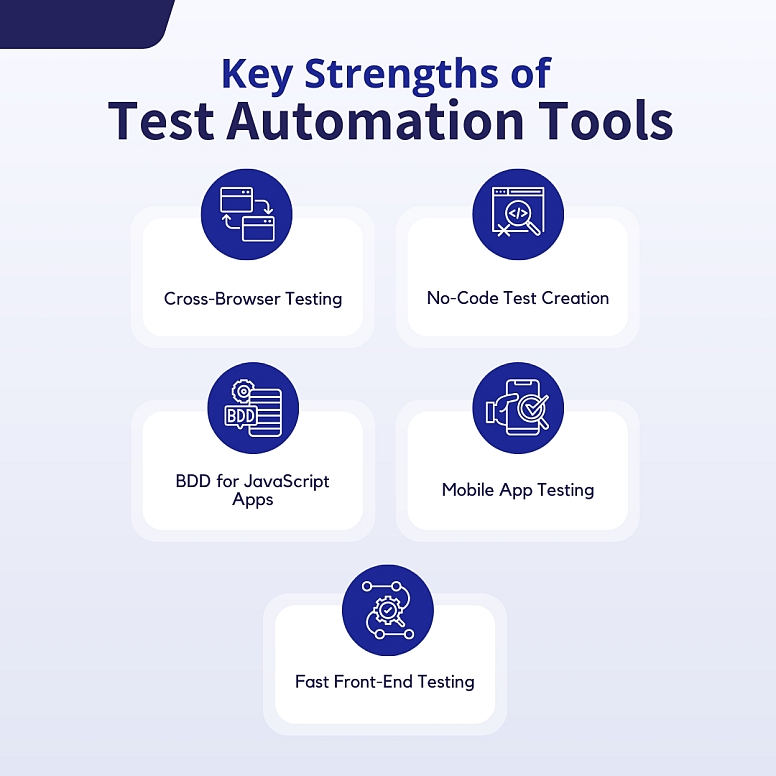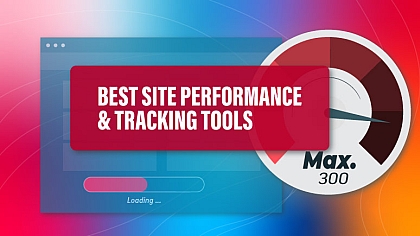
Top 5 Test Automation Tools for Faster and Reliable Testing
As development cycles become shorter, faster and more reliable testing is key to staying competitive. Testing automation has come to play an increasingly critical role in ensuring that applications are delivered on time and free of bugs. Automation testing streamlines teams' testing processes, detects issues early, and delivers higher-quality software while saving time and resources.
Let's take a close look at the top 5 automation tools for software testing and how they lead the pack to give more efficient and reliable testing.
What is Automation Testing?
Automation testing involves using specialized tools to execute test cases automatically, compare the actual results with the expected outcomes, and report on the success or failure of the tests.
Automated testing involves using scripts to replace or complement manual testing. These scripts allow tests to be run consistently, repeatedly, and at a larger scale. It's particularly useful for regression testing, load testing, and scenarios that require repetitive execution. This approach ensures more efficient and reliable testing, especially for tasks that need to be performed multiple times.
Now, let's explore the top 5 automation tools for software testing.
1. Selenium
Selenium has long been the go-to framework for automation testing. Selenium is an open-source cross-platform suite to support different types of testing for web applications. The tools provided are Selenium WebDriver, Selenium Grid, and Selenium IDE.
Each tool within Selenium supports different types of testing. One more reason it is used so widely is that it can be used with several programming languages including Java, Python, C#, and JavaScript, which makes it flexible in software development teams.
Key Features
- Cross-browser compatibility: Selenium allows running any kind of browser, whether it is Chrome, Firefox, Safari, or Edge.
- Parallel testing: Selenium Grid enables the running of tests on multiple test environments parallelly.
- Supports CI/CD pipelines: Selenium permits continuous integration and deployment practice to improve automated testing in the DevOps environment.
Advantages
- It supports many programming languages.
- It has an immersive ecosystem of integrations.
- There is great community support for troubleshooting and resources.
2. testRigor
Coming in at number two among leading automation platforms, testRigor test automation tools represent a cutting-edge solution designed for fast, reliable, and scalable test creation without the need for coding. Unlike other automation tools that are supposed to be scripted, testRigor favours a no-code approach where any user, ranging from QA engineers to business analysts can express themselves in writing tests in plain English. The time it might take to write and maintain the tests can be highly reduced, making it an excellent choice for teams that seek speed without sacrificing reliability.
Key Features

- Plain English test creation: This is one of the amazing features when you can write tests in natural language rather than coding skills.
- Cross-platform testing: Test web, mobile, and API all together from a single location using a unified testing approach.
- AI-driven test maintenance: testRigor harnesses AI to automatically adapt your tests based on UI changes, decreasing the need for manual upgradation.
Advantages
- Extremely time-efficient in creating and maintaining tests
- No complexity of scripting involved
- Ideal for non-technical members of your team; therefore, expands participation
3. Jasmine
Jasmine is a popular behavior-driven development (BDD) framework for testing JavaScript applications. It is most suitable for front-end developers to test their code in a clean and readable syntax. Jasmine doesn’t require any DOM which makes it perfect for unit testing in the browser and in Node.js environments. This is one strength that can help write easily maintainable tests with clear and descriptive syntax.
Key Features
- BDD testing framework: Promotes writing tests that describe the behaviour of the application in a user-friendly fashion.
- Standalone tool: It doesn't rely on any external dependencies or browsers.
- Mocking and spying support: Jasmine has built-in support for mocking objects and spying on functions for testing interactions.
Advantages
- Excellent for unit-testing JavaScript applications
- Readable, intuitive syntax for tests
- Built-in testing features like spies and mocks reduce the load for further libraries
4. Appium
Appium is an open-source test automation tool dedicatedly designed for mobile applications, allowing testing across both Android and iOS platforms. It supports a variety of programming languages such as Java, Python, Ruby, and JavaScript so that the developers can prepare their test scripts using their desired language. It's also cross-platform, meaning, you can write one test script that would work on the same Android or iOS device. As it follows the WebDriver protocol, Appium is also compatible with existing Selenium tests for web apps.
Key Features
- Cross-platform support: Test both Android and iOS apps using the same codebase.
- No app modification required: Appium does not require recompilation or alteration of any type of your application, and you can test it.
- Wide language support: Compatible with multiple languages including Java, Python, and JavaScript.
Advantages
- Open source and free to use.
- Suitable for native hybrid and mobile web applications.
- Parallel test code running across multiple platforms.
5. Cypress
Cypress is a modern test automation tool built specifically for front-end developers. It is useful for testing modern web applications, which are built using the frameworks React, Angular, or Vue.js. One of Cypress’s key differentiators is its architecture, which runs directly within the browser, giving it access to every DOM element. Developers then have real-time reloading, deep visibility into each test step, and instant feedback, making debugging incredibly fast.
Key Features
- Real-time testing: Cypress gives the power of time travel, where users can see every step of test execution.
- Fast test execution: tests run inside the browser, making them much faster than the traditional WebDriver-based tools
- Built-in waiting: waits for elements to load before executing actions making the tests not flaky
Advantages
- Extremely fast and reliable for front-end testing
- Easy and friendly developer interface.
- Excellent documentation and active community support.
Choosing the right automation tools for software testing depends on multiple factors, like application complexity, the skill set of team members, and certain testing requirements. Although Selenium is a day-to-day practical tool in most automated testing strategies because of its flexibility and open-source nature, tools such as testRigor are gaining popularity rapidly for their simplicity and no-code approach.
If your team specializes in front-end development, the execution of your application will be blazing-fast with the help of Cypress. Jasmine is ideal for behaviour-driven development in applications developed using JavaScript, and Appium remains the most inclusive solution for mobile app testing.
Ultimately, using the best automation tools in your development process will dramatically reduce testing time, assure you of improved software quality, and make it possible for your team to release products faster, with high quality and reliability. With the continuous increase in demand for better-quality software, testing automation will continue to become an integral part of any viable software development strategy.
FAQs
- What is automation testing and why is it important?
Automation testing involves performing tests by utilizing certain tools and comparing actual with expected output. Through automation testing, teams can save time, avoid a lot of human errors, and be sure that their applications get to be tested in time and uniformly across multiple environments.
- How do I choose the best automation testing tool for my project?
You depend on factors like your technology stack, the skills of your team, and the complexity of your application in choosing the right tool. You need to consider whether the tool supports the target platforms, integrates well into the development pipeline, and meets your testing needs.
- Is no-code automation better than traditional coding-based tools?
No-code automation tools, like testRigor, would be the best choice for teams that require speed and simplicity without deep technical knowledge. In contrast, traditional coding-based tools like Selenium offer excellent flexibility and customization capabilities toward more complex test scenarios.














